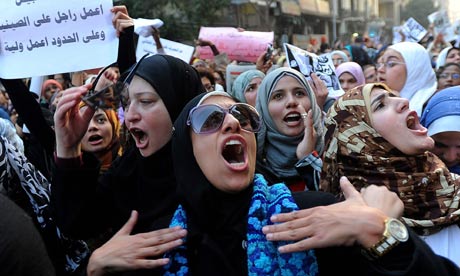Human Rights of Women
Source: The Guardian
Last week, Egypt's Muslim Brotherhood issued a strongly-worded statement unabashedly rejecting the draft UN declaration calling for an end to all forms of violence against women. It claims that the declaration contravenes Egypt's "cultural specificity" and would lead to "the complete disintegration of society" if ratified. Needless to say, the statement has fuelled the anger of Egyptians, especially women.
But why has the Brotherhood decided to embark on this confrontational course through the release of such a belligerent statement at such a critical moment? The president, Mohamed Morsi, is facing huge opposition at home and mounting criticism internationally. In speaking openly, almost defiantly, about the potentially explosive issue of women, the Brotherhood is risking further anger at home and alienating the international powers that have been supporting them.
The Brotherhood probably felt impelled to send a not-so-covert threat to Egyptian women. Throughout the past seven months, Egypt's rulers have done their utmost to take women out of the political equation, as their active participation in protests has become a real headache for the Morsi regime. The statement seems to have been conceived in response to their mounting pressure and the vocal opposition, and intended to reassert the dominance and power of the Brotherhood. The subtext of the statement is that the new regime has no intention of respecting the rights of women enshrined in the international agreements to which Egypt is a signatory.
Before his election, Morsi had tried to promote his image as a democratic and progressive leader who respected women's rights. He even pledged to appoint a woman as one of his deputies. It was a pledge, like several others, that he never honoured. Instead, women have been witnessing shocking acts of violence against them as the state has looked on, pretending to see nothing. The systematic sexual harassment of female protesters and the violence experienced not only by women demonstrators but also by ordinary women going about their business on the streets have become a daily occurrence. In the face of growing violence, however, women have remained adamant and defiant.
The Brotherhood and its offspring, the presidency, never considered violence against women to be an important issue, even when they said otherwise. Their support of female genital mutilation (FGM) is just one example. Attempts were made in the short-lived Islamist-dominated parliament to decriminalise it and if it hadn't been for the vocal opposition of women, the legislation might have passed. When Morsi was once asked about his views on the subject, instead of clearly and unambiguously condemning the practice, he said that it was a decision that should be left to the family concerned. Thus the brutal cutting up of a piece of a girl's flesh was treated by him with the same kind of callous indifference as the decision to go for a family picnic.
In reading the Brotherhood's statement bashing the attempt to stop violence against women, one might think that the writers have suddenly woken from their slumber and have crashed headlong into the 21st century. How else can we understand their horror at the idea that marriage should be based on partnership and not guardianship? Or their utter dismay at the suggestion that a woman should not obtain her husband's consent before she can travel, work or take contraceptives? Or their shock at the simple insinuation that husbands should not have a free hand to beat up or rape their wives?
To the Brotherhood, I offer this following simple logical argument: abusing human beings is wrong. Women are human beings. Therefore abusing women is wrong. Too much to ask for? Or too hard to understand?
Of course, the argument can only be valid if we all agree with the basic premise that women are human – for it is possible that the Brotherhood would contest this fact. As is clear in Brotherhood literature and discourse, women are often figuratively referred to in demeaning terms. How often have women been described as precious stones that are so valuable that they need to kept under lock and key and protected against theft? Or as candy bars that have to be wrapped up in order to keep away the flies? Or as lower-class citizens who should be restrained and protected against their own immoral and destructive instincts?
As modern history is not the Brotherhood's strongest suit, I can only tell them that for more than 100 years, Egyptian women have fought tooth and nail for the right to be regarded as human beings and to be treated with the dignity and respect they deserve. Dignity and respect, my dear Brothers, are not culture-specific, and neither is violence, which cannot be condoned under any pretext, be it religious, cultural or social. The Brotherhood's statement has exposed it for what it really is: a misogynistic, power-hungry and hopelessly anachronistic organisation.

